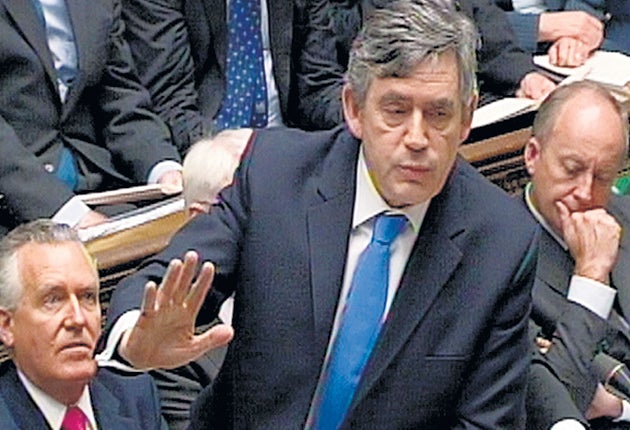Corrupt MPs face axe from angry voters
Prime Minister's plan for constitutional reform to give people power to 'recall' MPs

Your support helps us to tell the story
From reproductive rights to climate change to Big Tech, The Independent is on the ground when the story is developing. Whether it's investigating the financials of Elon Musk's pro-Trump PAC or producing our latest documentary, 'The A Word', which shines a light on the American women fighting for reproductive rights, we know how important it is to parse out the facts from the messaging.
At such a critical moment in US history, we need reporters on the ground. Your donation allows us to keep sending journalists to speak to both sides of the story.
The Independent is trusted by Americans across the entire political spectrum. And unlike many other quality news outlets, we choose not to lock Americans out of our reporting and analysis with paywalls. We believe quality journalism should be available to everyone, paid for by those who can afford it.
Your support makes all the difference.Corrupt MPs would be expelled from Parliament under emergency moves to be unveiled within weeks to rebuild trust in Westminster following the Commons expenses scandal.
A new statutory code of conduct for politicians that was announced by Gordon Brown will include tougher sanctions for those found guilty of fraud, such as the loss of their seats.
Electors could also be given the power to "recall" dishonest and incompetent MPs as long as the move was supported by enough voters in a constituency.
Making his first major speech since seeing off moves to oust him as Prime Minister, Mr Brown said he would press ahead with the "final stages" of Lords reform and called for a national debate on changing the voting system. The Prime Minister confirmed that a new watchdog would monitor politicians' expenses and that MPs would be required to abide by a code of conduct governing their behaviour. The moves will be rushed on to the statute book over the summer and come into force by the end of the year if – as looks certain – they are backed by the major parties.
Noting that no one had been expelled from the Commons since 1954 and that an MP could be jailed for up to a year and keep his seat, Mr Brown protested that current punishments for MPs were outdated and "not fit for purpose".
He told the Commons: "This is not a modern and accountable system that puts the interests of constituents first."
Mr Brown, who disclosed in The Independent last month his support for giving voters the powers of "recall", said he wanted the parties to examine the principle of MPs facing by-elections, if their electors backed such moves.
He disclosed that all MPs' expenses receipts from the past four years would be published within the next few days.
In a wide-ranging speech on constitutional reform, he said ministers would make a fresh attempt this summer to remove the remaining hereditary peers and make the House of Lords an 80 or 100 per cent elected chamber after peers blocked an earlier move last year.
He called for a wider debate on the Westminster voting system, although there is little prospect of any changes being proposed before the election expected next spring. They could instead feature in Labour's next manifesto. Mr Brown said any new voting system had to retain the link between MPs and constituents. He suggested he favoured the "alternative vote" model, under which voters rank candidates in order of preference.
David Cameron, the Conservatives leader, said Mr Brown was acting out of self-interest because Labour faced defeat the next time the country votes.
A parliamentary commission will be set up to reform Commons procedures to make them more relevant to voters and backbenchers. Mr Brown confirmed the Government was also considering lowering the voting age to 16 and allowing most official documents to be released after 20 years instead of 30.
Separately, The Daily Telegraph has reported that the newly appointed Communities minister Shahid Malik has admitted that the taxpayer had met the costs of office space in his constituency house and his designated second home in London simultaneously.
Join our commenting forum
Join thought-provoking conversations, follow other Independent readers and see their replies
Comments